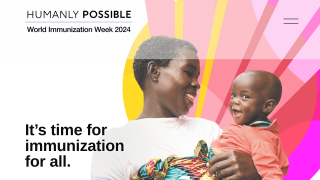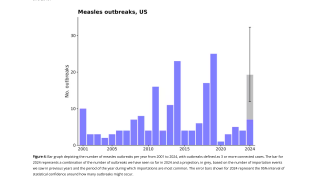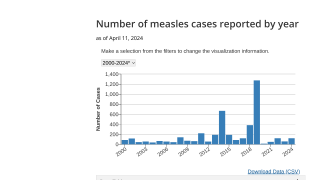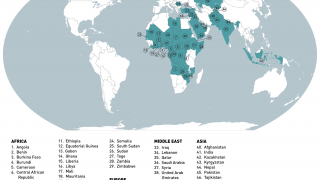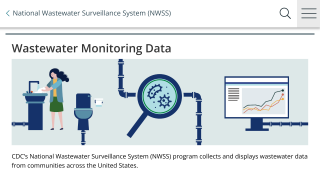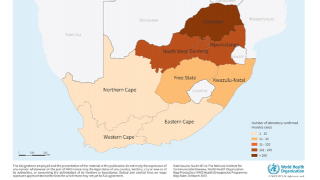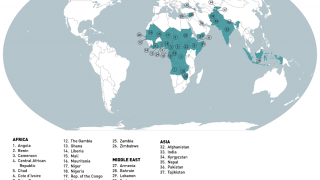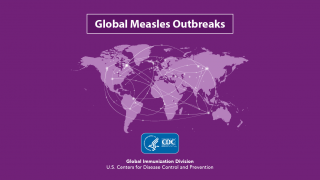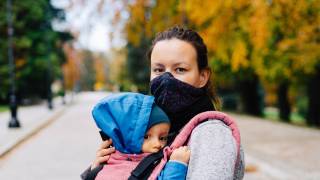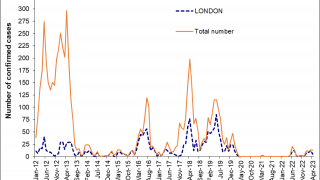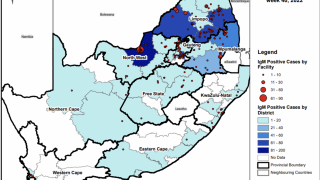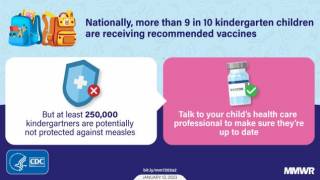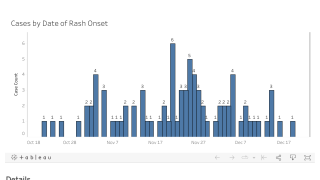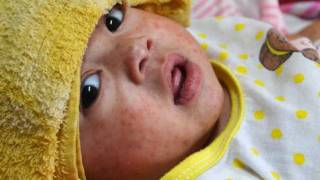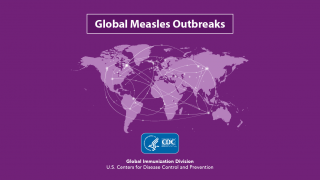Ukraine’s Measles Outbreak Surpasses 2018 Record

Many countries around the world are experiencing measles outbreaks, with the latest data indicating an overall 10 percent increase this year.
As of November 5, 2019, there have been 440,263 confirmed cases reported by 187 Member States to World Health Organization (WHO).
In the WHO's European region, the country of Ukraine has reported the most measles cases during 2019, with 56,802.
This data compares with about 54,000 measles cases in all of 2018, which was more measles cases than all of the European Union combined.
This negative news can be related to Ukraine’s 42 million residents being counted in the WHO’s leading countries with the highest number of unvaccinated children.
Unfortunately, Ukraine is geographically positioned to be a conduit for the continued spreading of the measles virus. Ukraine is bordered by Russia to the north-east; Belarus to the north; Poland, Slovakia, and Hungary to the west; and Romania, Moldova, and the Black Sea to the south.
Moreover, the recent measles outbreak in Brooklyn, New York may be related to thousands of Breslov Hasidic Jews visiting the Ukrainian city of Uman in 2018, reported the New York Times.
In Ukraine, many parents are questioning their children’s vaccinations. In Ukraine, infants can be vaccinated for measles at age 6 months.
Their doubts are rooted in an inconsistent healthcare system and mistrust of authority.
Dr. Fedir Lapiy, a pediatric immunologist from Kiev, told Euronews in April 2019, ‘that fears and mistrust in doctors meant parents in Ukraine were finding ways to avoid routine immunizations.’
"We all know that there is a huge number of fake vaccinated children,” he said. “Every mum at the playground knows it.”
They say ‘all the mothers do it, they just go and bribe the doctor or a nurse’.
This vaccine mistrust is not limited to Ukraine. The WHO identified “vaccine hesitancy” as a top 10 threat to global health.
Vaccine hesitancy – the reluctance or refusal to vaccinate despite the availability of vaccines – threatens to reverse progress made in tackling vaccine-preventable diseases, says the WHO.
Vaccination is one of the most cost-effective ways of avoiding disease – it currently prevents 2-3 million deaths a year, and a further 1.5 million could be avoided if global coverage of vaccinations improved.
An estimated 19.9 million infants worldwide were not reached with routine immunization services during 2017, says the WHO.
The reasons why people choose not to vaccinate are complex.
A vaccine advisory group to WHO identified complacency, inconvenience in accessing vaccines, and lack of confidence are key reasons underlying hesitancy.
Health workers, especially those in communities, remain the most trusted advisor and influencer of vaccination decisions, and they must be supported to provide trusted, credible information on vaccines.
The good news is that 167 countries have now included a 2nd dose of measles vaccine as part of their routine vaccination schedule.
Nevertheless, coverage levels remain well short of the WHO recommended measles immunization coverage of at least 95% to prevent outbreaks.
In the USA, the Centers for Disease Control and Prevention (CDC) continue to warn international travelers for their infectious disease risks. The CDC has issued various Travel Alerts for countries experiencing disease outbreaks.
Furthermore, the CDC suggests speaking with a healthcare provider prior to traveling overseas.
‘It’s important to talk to your doctor about vaccines to keep you safe during and after international travel,’ says Drs. Megan Berman and Richard Rupp, at the University of Texas Medical Branch in Galveston, Texas.
‘This recommendation is particularly important considering that many countries don’t have robust pediatric vaccination programs, so travelers will not benefit from the herd immunity afforded by such programs.’
The measles virus is more contagious than flu. The virus that causes it lingers in the air and on surfaces for more than an hour.
>>Check Your Measles Immunity<<
The CDC says ‘the best way to protect yourself and your loved ones from measles is by getting vaccinated. You should plan to be fully vaccinated at least 2 weeks before you depart.’
Furthermore, ‘if your trip is less than 2 weeks away and you’re not protected against measles, you should still get a dose of measles-mumps-rubella (MMR) vaccine.’
Two doses of the MMR vaccine provides about 97 percent protection against measles, while 1 MMR dose provides 93 percent protection.
As of December 1, 2019, Ukraine remains included in the CDC’s Global Measles Alert.
International Measles news published by Vax Before Travel
Our Trust Standards: Medical Advisory Committee

